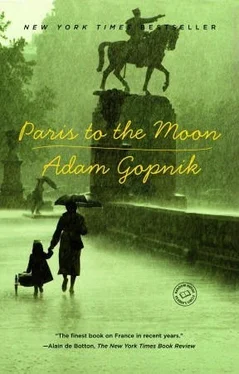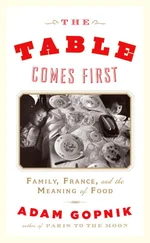* * *
We went to New York first in December and then in January, to find a place to live. The forces drawing us home were pretty strong and even pretty attractive: We wanted Luke to go to a New York school, for one thing. “We have a beautiful existence in Paris, but not a full life,” Martha said, summing it up, “and in New York we have a full life and an unbeautiful existence.”
Luke had come to associate French, for us the language of romance and the exotic, with authority and order, with school. It was his German. Sometimes, at home, he would pretend to be Zeus and call out to his French teachers from the top of Mount Olympus. “ Oui, oui, oui?” he would then say, mimicking their high, humorless accents as they turned their heads to look up at the god on the mountain. Then, zap, right between the eyes with a thunderbolt. He would produce what I believe is called a mirthless laugh, even with French administration at last.
Martha had at least been allowed to glimpse a proper copy shop in Paris. It was down near the rue Vavin, just outside the Luxembourg Gardens. We came across it one day, on one of our last strolls, walking home from the playground. A vast glass front, pristine, humming, superfast color Xerox machines, ten or twenty of them, right in front, eager attendants in white T-shirts, ready to collate a manuscript or laser-copy a photograph: It was her Xanadu, right there where you needed it and just as we were leaving.
When we got back, still cold February weather, we went up to the Luxembourg Gardens again, and Luke, slightly to my surprise, said that he wanted to go on the carousel. Martha sat on the little bench with Olivia, nursing discreetly. (“You can’t really nurse in Paris openly,” she said the other day, “the way I could in New York. I’m always putting on a scarf, and I feel people staring at me. It’s not puritanical, really, more sort of the opposite. It’s that baring your breast here is really meaningful and loaded.”)
Luke got up on one of the beat-up and beautiful old horses. There were a couple of other kids up there too in the cold weather—Paris winter, neither bitter nor chilly nor sunny, life under the perpetual gray skies. Luke asked for a stick when the guy offered them around and held it tight, and I recalled the near baby who had come to Paris five years before.
The carousel started up, and Luke, back absolutely straight, brow slightly creased, watched the man holding the rings. His stick dipped to pick up the ring, and angled to let the ring with its little leather tag drop to its end. One. Once around again the second time, back straight, stick out, ring on—perfect. The carousel picked up speed, and since it has no music, the only sound you could hear was the sound of the ancient wheezing fan belt going faster and faster as it drove the horses and carriages around. Bang, bang—two more rings, picking them like cherries:
back straight, stick out, unsmiling, taking one ring after another and slipping it down his wood baton.
I was unreasonably pleased and then felt a little guilty about my own pleasure. It seemed so American, so competitive; the other French fathers on the bench just sat there, watching with sober pleasure, not seeing even a carousel as a competitive sport. But as Luke whirled around, now really going fast, and grabbed still another ring—I only knew it now by the slight clang of wood on metal and the ring missing—I couldn’t help myself.
“Hey, sir”—I call him sir a lot, Johnsonianly—“you’re unconscious.”
Luke, a blur of gray coat on the brown horse.
“What means unconscious ?” I heard him ask, his voice clear and then fading away as the carousel whipped him around.
“It means you’re doing great without even thinking about it,” I called out.
The carousel was beginning to slow down now—the normal five-minute ride at an end. I saw the man’s hand on the lever, bringing the ride to its close.
“Daddy,” Luke said, and I thought I heard a little concern in his voice, a small edge of worry, “Daddy, I am thinking about it,” he said, and he didn’t even try for the one last ring that the man held out, before the carousel stopped for good and the man took back the stick and shook off the rings, so dearly won, to give to the next child who would get up on the carousel in the Luxembourg Gardens and give it a try.
Adam Gopnikhas been writing for The New Yorker since 1986, and his work for the magazine has won the National Magazine Award for Essay and Criticism as well as the George Polk Award for Magazine Reporting. He broadcasts regularly for the Canadian Broadcasting Corporation, and is the author of the article on the culture of the United States in the last two editions of the Encyclopedia Britannica. From 1995 to 2000 Gopnik lived in Paris, where the newspaper Le Monde profiled him as a “witty and Voltairean commentator on French life,” and the weekly magazine Le Point wrote, “It is impossible to resist delighting in the nuances of his articles, for the details concerning French culture that one discovers even when one is French oneself.” He now lives in New York with his wife, Martha Parker, and their two children, Luke Auden and Olivia Esme Claire.
This book was set in Fairfield, the first typeface from the hand of the distinguished American artist and engraver Rudolph Ruzicka (1883-1978). In its structure Fairfield displays the sober and sane qualities of the master craftsman whose talent has long been dedicated to clarity. It is this trait that accounts for the trim grace and vigor, the spirited design and sensitive balance, of this original typeface.
Copyright © 2000 by Adam Gopnik
All rights reserved under International and Pan-American Copyright Conventions. Published in the United States by Random House, Inc., New York, and simultaneously in Canada by Random House of Canada Limited, Toronto.
Much of the contents of this book was originally published in The New Yorker.
RANDOM HOUSE and COLOPHON are registered trademarks of Random House, Inc.
Library of Congress Cataloging-in-Publication Data Gopnik, Adam. Paris to the moon /Adam Gopnik. p. cm.
ISBN 0-679-44492-0
1. Gopnik, Adam—Homes and haunts—France—Paris. 2. Americans—France—Paris. 3. Paris (France)—Social life and customs—20th century. I. Title.
DC718.A44 G67 2000 944’.3600413—dc21 00-037297
Random House website address: www.atrandom.com
Printed in the United States of America on acid-free paper
4689753 Book design by Caroline Cunningham












